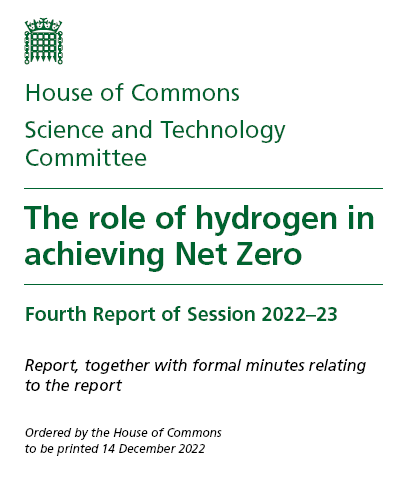The Hydrogen Distraction
The oil and gas companies are promoting the use of “blue hydrogen” via the gas grid as an intermediate route to achieving low carbon heating using “hydrogen-ready" boilers.
H2 is just a vector
Hydrogen is not a fuel that can be found as pure hydrogen molecules in high concentration anywhere in nature. It can be manufactured from fuels like methane and used as a store of energy, or a means of transporting saved energy for use elswhere: "H2 is just a vector".
Blue Hydrogen
“Blue hydrogen” is derived from fossil gas using the steam methane reformation process: this releases tons of CO2. However, those promoting it like to suggest that the CO2 released could be captured and magically sequestered: Carbon Capture and Storage (CCS). However, CCS has never been demonstrated at scale and formidable technical problems would have to be overcome before this could be implemented technically, let alone economically. This is a re-run of the idea behind “clean coal” when it was also suggested that CO2 from burning coal in power stations could also be captured and stored away.
CCS is proposed as a means of turning gas into a low carbon fuel. However, there are major problems with this. The first problem is that methane has to be extracted before the process can begin and gas exploration always involves the escape of some methane in the process. This fugitive methane, like all other releases of methane, is the release of a major greenhouse gas, with a global warming potential 56 times that of CO2 over 20 years. The second problem is that not all of the CO2 released in steam methane reformation can be captured. For these reasons, the use of blue hydrogen is not compatible with Net Zero.
Green Hydrogen
“Green hydrogen” is derived from the electrolysis of water using green electricity to separate H2O into H2 and O2. This is compatible with Net Zero, but burning green hydrogen derived from electrolysis is a very inefficient route to providing low carbon heating. Apart from the cost of installing electrolysers this route to providing heating takes five times as much electricity as the more straightforward route which is to use the electricity directly in heat pumps to provide heating. Therefore burning green hydrogen to provide heating is not compatible with sound economics.
The reason for promoting the use of hydrogen for low carbon heating
So if blue hydrogen is not compatible with Net Zero and green hydrogen is not compatible with sound economics, why is anyone promoting the burning of hydrogen to provide heating?
The answer is that the oil and gas companies have a vested interest in the sale of fossil gas and are desperate to promote any plausible argument to continue selling their products – in spite of the consequences to global warming.
This is the basis of "The Hydrogen Distraction".
Why is the hydrogen distraction so attractive to politicians?
Why is the hydrogen distraction so attractive to politicians, and to those who do not understand the science?
Because the hydrogen "solution" meets all the criteria for satisfying wishful thinking:
- it would be good if it were true
- and it provides an excuse for delaying real investment now, in the hope that a magical solution might appear in ten years time.

The role of hydrogen in achieving Net Zero
In December 2022 the Science and Technology Committee of the House of Commons published its report on The role of hydrogen in achieving Net Zero.
Having taken extensive evidence from a variety of interests and academics the committee reached a clear conclusion that for economic and practical reasons hydrogen is unlikely to contribute toward achieving Net Zero in anything other than a very limited role.
The MPs concluded:
It seems likely that any future use of hydrogen will be limited rather than universal. It is likely to be best suited to applications or places which are:
- hard to electrify—such as some parts of the rail network
- uses that do not require the creation of an extensive refuelling network—such as local bus services
- users who are adjacent to, or accessible to, places where hydrogen is produced, such as industrial clusters.
In addition, hydrogen has important potential uses as:
- a means of energy storage
- a source power for energy intensive industries like steel, glass and mineral production.
The MPs go on to say that their skeptical view of the role of hydrogen as limited – rather than universal – should inform Government policy: For example, we disagree with the Climate Change Committee’s recommendation that the Government should mandate new domestic boilers to be hydrogen-ready from 2025.
The MPs are equally skeptical about the economics of hydrogen use in vehicles powered by hydrogen fuel cells. This mirrors their concern about the running cost of burning "green" hydrogen for heating in "hydrogen-ready" boilers.

